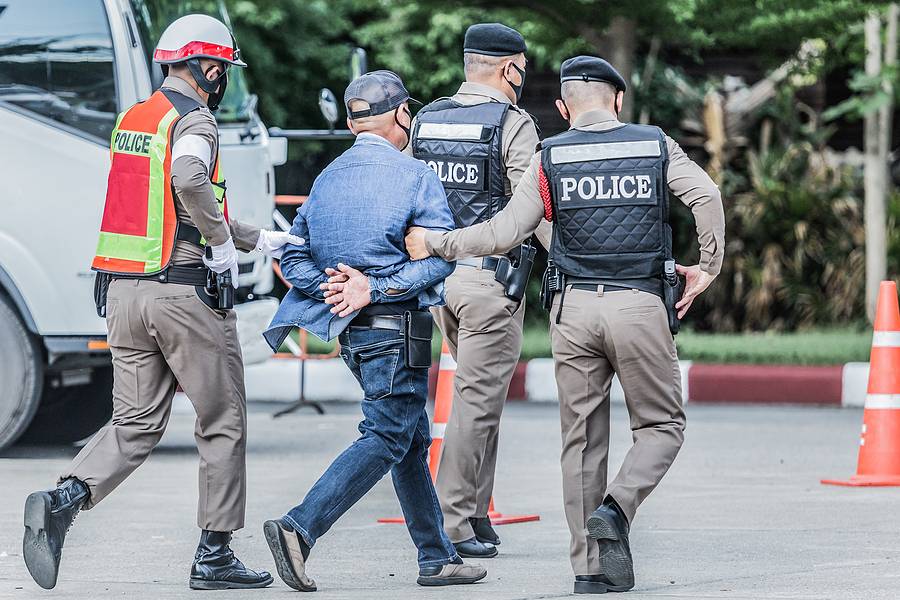Texas divides crimes into misdemeanors and felonies. Felonies are the more severe crimes and degrees of felonies differentiate among the severity of the offense. Many felony offenses are violent in nature.

Texas divides felonies into five degrees from most to least severe: 1) capital felonies, 2) first-degree felonies, 3) second-degree felonies, 4) third-degree felonies, and 5) state jail felonies. Below is more information about the degrees of felonies in Texas.
What is a Capital Felony in Texas?
A capital felony is the most serious offense that you can be charged with in Texas. If you are convicted of a capital felony, you can face the death penalty. If the prosecutor does not seek the death penalty, the offender faces life without parole. However, offenders under 18 years old are not eligible for life without parole.
Two examples of capital felonies in Texas include capital murder and treason.
What is a First-Degree Felony in Texas?
First-degree felonies are punishable by between five to 99 years in prison or life. In addition, the judge can order fines of up to $10,000. Obviously, the range between five years and life in prison is very wide. The jury will decide what punishment is fair. This is one of the main reasons why having a qualified Frisco criminal defense attorney on your side is so critical. They will fight to get you the lowest sentence possible.
Some examples of first-degree felonies in Texas include:
- Aggravated kidnapping,
- Aggravated robbery, and
- Aggravate sexual assault.
What is a Second-Degree Felony in Texas?
Second-degree felonies carry a penalty of between two and twenty years in prison and up to $10,000 in fines. Depending on the charge, offenders could be eligible for probation.
Examples of second-degree felonies include:
- Aggravated assault,
- Sexual assault,
- Manslaughter, and
- Arson.
What is a Third-Degree Felony in Texas?
A conviction for a third-degree felony carries between two and ten years in prison and up to $10,000 in fines. Offenders can get probation.
Common examples of third-degree felonies in Texas include:
- Indecent exposure to a child,
- Tampering with evidence,
- Deadly conduct with a firearm, and
- Stalking.
What is a State Jail Felony in Texas?
A state jail felony is the least serious type of felony in Texas. They are punishable by 180 days to two years in state jail and fines of up to $10,000.
Some examples of state jail felonies in Texas include:
- Firearm theft,
- Possession of child pornography, and
- Check forgery.
When are Felonies Enhanced in Texas?
If you have a prior felony conviction (except a state-jail felony) and are convicted of another felony, your penalties will be enhanced as listed below:
- If your second conviction is for a first-degree felony, you will face a sentence of 15-99 years or life in prison.
- If your second conviction is for a second-degree felony, sentencing will be the same as a first-degree felony.
- If your second conviction is for a third-degree felony, sentencing will be the same as a second-degree felony.
- If your second conviction is for a state jail felony, sentencing is the same as for a third-degree felony.
If you have two or more felony convictions of any degree (except a state jail felony), you are considered a habitual offender. Habitual offenders are severely penalized in Texas. Your third conviction carries a sentence of 25-99 years or life in prison. For example, if you were previously convicted of two third-degree felonies and are convicted for another third-degree felony, you face 25 to 99 years of life in prison, instead of the typical two to ten years.
What are the Collateral Consequences of a Felony Conviction in Texas?
In addition to prison time and fines, a felony conviction, no matter the degree, can have a significant negative effect on your career, reputation, education, family, and activities. Below are a few potential effects of a felony conviction in Frisco, Texas.
- Loss of government benefits,
- Disqualification from student and federal loans,
- Ban on owning firearms,
- Lose your right to vote,
- Suspension of driving license,
- Suspension of professional license, and
- Difficulty obtaining employment.
Speak to an Experienced Frisco Criminal Defense Attorney
If you or someone you know is facing criminal charges, and need to know more about the degrees of felonies, you should immediately reach out to a local Frisco criminal defense attorney. Philip D. Ray is an experienced criminal defense attorney and former prosecutor who will provide you with a skilled and aggressive defense. Call The Law Offices of Philip D. Ray today at (469) 588-6770 for a consultation.
